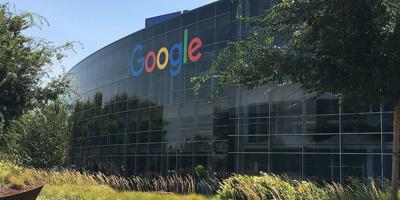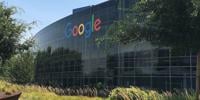
Google headquarters
MACOMB, ILLINOIS - Attorneys who led a class action lawsuit against Google for allegedly improperly scanning faces and recording voices of school children using Google software on Chromebooks are expected to attempt to claim 40% of an $8.75 million fund the tech giant has agreed to pay to settle the case.
Earlier this year, a judge in McDonough County Circuit Court granted preliminary approval to the deal to end the 5-year-old legal action lodged against Google under Illinois' stringent biometrics privacy law.
The case had initially landed in San Francisco federal court in California, when attorneys from the class action firms of Bursor & Fisher, of Walnut Creek, California, and Hedin Hall, of San Francisco, first filed suit.
They have been joined in the action by attorneys from the firms of Ahdoot & Wolfson, of Burbank, California, and Carey Rodriguez Milian, of Miami.
The lawsuit was brought on behalf of named plaintiffs including two children, identified only as H.K. and J.C., through their father Clinton Farwell, of Bushnell, Illinois, which is in McDonough County in western Illinois.
The plaintiffs sought to expand the action to include at least tens of thousands of other schoolchildren and their parents in Illinois.
In the lawsuit, the plaintiffs asserted Google had "infiltrated the primary and secondary school system" in Illinois and elsewhere in the U.S. "by providing access to its 'ChromeBook' laptops, which come pre-installed with its 'G Suite for Education' platform (formerly referred to as Google Apps for Education), to over half of the nation's school children, including those in Illinois."
According to the complaint, Google's software on the Chromebooks would allegedly scan the students' faces and record and store their "voiceprints" without consent, allegedly in violation of the Illinois Biometric Information Privacy Act (BIPA).
The lawsuit came amid a blizzard of thousands of such filings in the past decade, as trial lawyers sought to take advantage of the BIPA law's stringent notice and consent requirements, large statutory damage figures, and a string of anti-business court rulings to secure relatively easy settlements from businesses terrified of even larger losses should the cases go before a jury.
Enacted in 2008, the Illinois BIPA law was ostensibly designed to safeguard the so-called unique identifying biometric information of employees and customers, including their fingerprints, facial geometry and other unique physical characteristics. Lawmakers at the time said the measure was inspired by the collapse of the company known as Pay By Touch, which had been among those pioneering the ability of consumers to pay for goods and services using fingerprint scanners.
Since 2015, however, the BIPA law has been used by a growing cadre of trial lawyers to target businesses of all types and sizes with an onslaught of thousands of class action lawsuits filed in Cook County and other courts in Illinois, and now even in other states.
The bulk of the lawsuits have targeted businesses, accusing them of improperly scanning their workers' fingerprints, faces, voices and other biometric characteristics, without first obtaining written consent or providing notices about how that information might be stored, used, shared and destroyed, among other technical provisions in the law.
A number of the lawsuits, however, have also taken aim at tech giants, including Facebook and Instagram parent Meta and Google. Some of the settlements in those actions have resulted in paydays worth hundreds of millions of dollars, generating headlines around the country.
To this point, the lawsuits have failed to provide any examples of actual harm to any plaintiffs.
However, thanks to favorable rulings by the Illinois Supreme Court, the plaintiffs have never been required to do so, allowing the lawsuits - potentially worth many millions or even billions of dollars - to advance in the courts and pressure the business defendants into settlements.
From those settlements, the biggest winners have typically been the trial lawyers who have brought the lawsuits. They have collectively raked in hundreds of millions of dollars in fees, with those totals continuing to grow.
In the latest case against Google, the lawyers withdrew their lawsuit in San Francisco, but quickly refiled the action in McDonough County Circuit Court.
Google removed the case to federal court in the Central District of Illinois in 2021. In 2023, however, much of the case was ordered back to McDonough County court for proceedings under Illinois' more plaintiff-friendly standards.
In the meantime, Illinois state lawmakers revised the BIPA law, specifically to remove the possibility for what critics called "absurd" and "annihilative" damage awards. Previously, the Illinois Supreme Court had interpreted the law to allow plaintiffs to claim damages of $1,000 to $5,000 each time a device completed a biometric scan. Under the new law, they could only demand damages for the first such scan.
To this point, courts have interpreted the new law to not apply to lawsuits filed previously.
However, after Illinois changed the law, Google and the plaintiffs asked the federal judge to send the case back to McDonough County court to secure a settlement.
McDonough County Judge Heidi A. Benson granted preliminary approval to the settlement in May.
Under the terms of the settlement, Google agreed to pay $8.75 million to end the action.
The settlement would result in payments of $30-$100 per class member, according to court documents. The class would include Illinois residents who "had a voice model or face model created or had the Voice Match or Face Match feature enabled in their (Google Workspace for Education) account" since 2015.
However, under the settlement, the plaintiffs' lawyers are also authorized to ask the court to award them up to 40% of the settlement funds as fees. That would mean the lawyers could claim up to $3.5 million.
Plaintiffs are represented by attorneys Robert R. Ahdoot and Tina Wolfson, of Ahdoot & Wolfson; Joseph I. Marchese, Joshua D. Arisohn and Philip L. Fraietta, of Bursor & Fisher, of New York; Frank S. Hedin, of Hedin LLP, of Miami; John C. Carey, of Carey Rodriguez, of Miami; and Andrew John Stuckart, of Bougher Krisher & Associates, of Macomb, Illinois.
Google has been represented by attorneys Nicola Menaldo, Kathleen A. Stetsko, Bobbie Wilson, Sunita Bali and Elliot Joh, of Perkins Coie LLP, of Seattle, Chicago and San Francisco.


